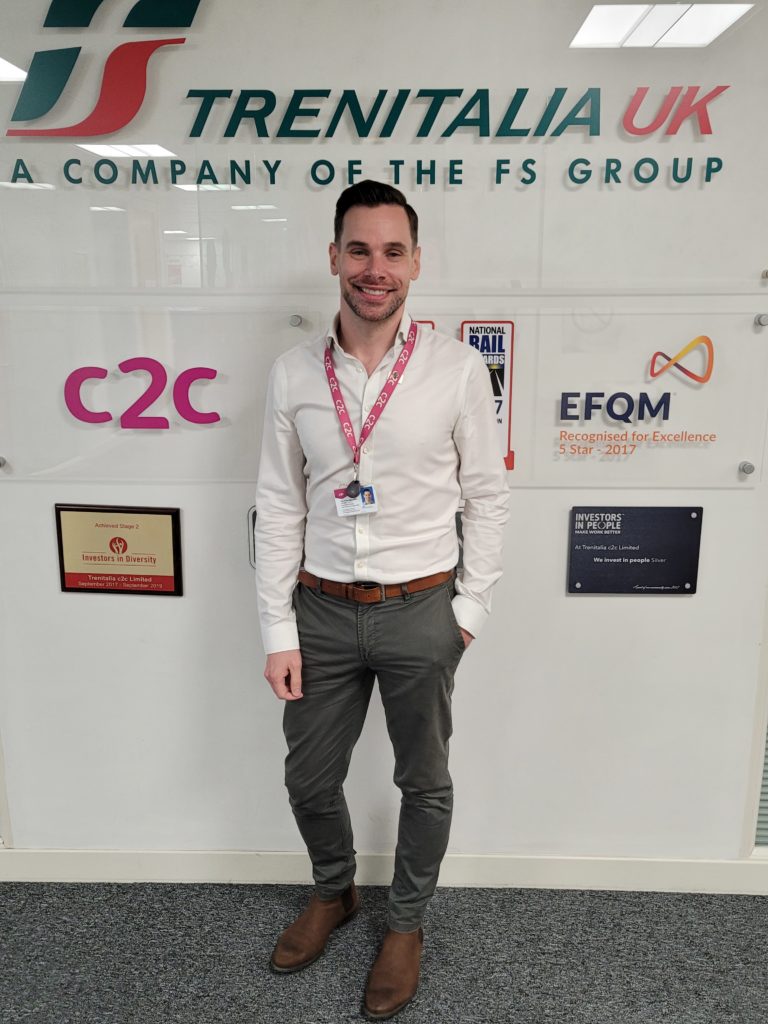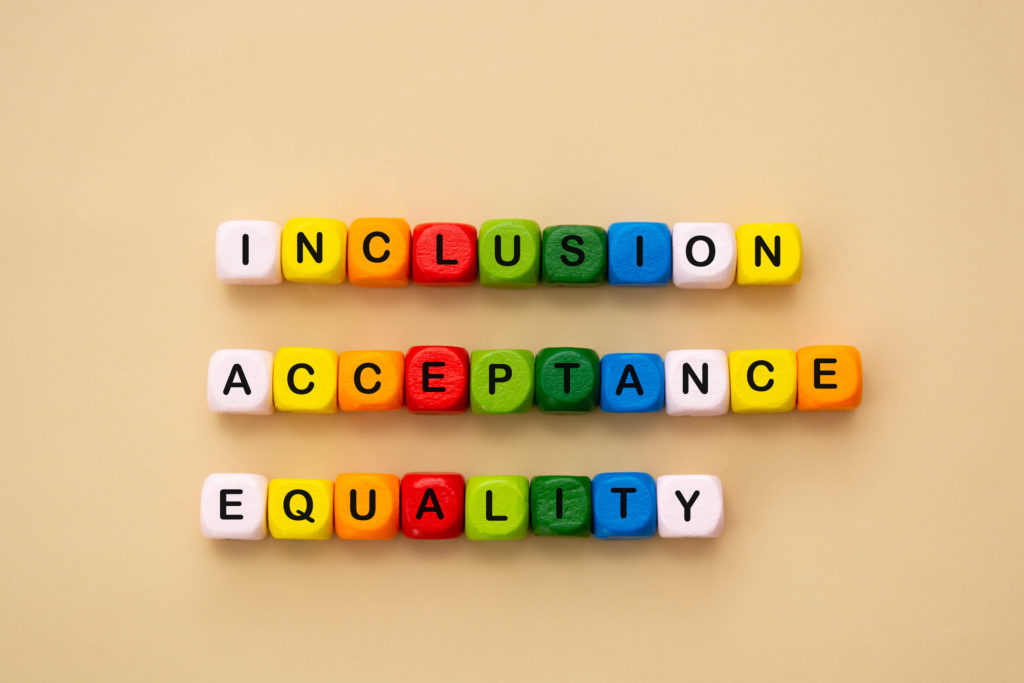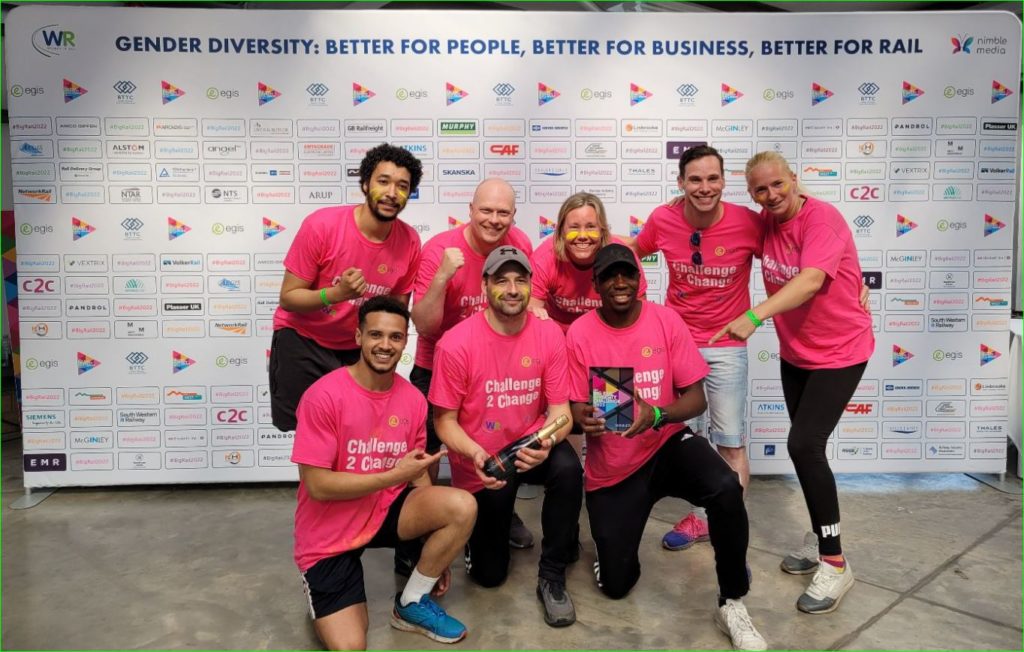Paul McGunnigle-White is an experienced finance manager and team builder, with a passion for diversity and inclusion. He is a driving member of the EDI group at Trenitalia c2c and represents the company on the RIA / WR EDI Charter working group. RailStaff caught up with Paul to talk about the broad subject of diversity and inclusion, his experience working in the rail industry, and his vision of EDI for the future.
Hi Paul, thanks for joining us. To begin could you give me a brief overview of your work at Trenatalia c2c and what led you to join the company’s EDI committee?

I’ve worked in finance for about 20 years now, but only joined the rail industry in 2017 when I became treasury manager at Trentitalia c2c. I manage all bank accounts and payment related company relationships for c2c and Trenitalia UK Limited. I also manage the Station Accounts functions and my job as treasury manager, can sometimes be very demanding.
One of the main reasons I wanted to be a part of the EDI committee, is because I wanted to be active in trying to make a more inclusive workforce. For me, as a gay man, I sometimes still get looks of disapproval if, for example, I’m out in public holding hands with my husband, and it makes you feel so unwelcome. There are still places – pubs and bars for example – where I can walk in and instantly feel ‘this isn’t the right place for me’.
When the Black Lives Matter movement became big news, there was a lot of talk here at c2c, asking whether we were doing enough to support people of colour. Were we making our staff’s voices heard? I remember that really lit a fire underneath me and I was really encouraged by the company to pursue my passion for diversity and inclusion.
At times it’s a juggling act between my role as treasury manager and my EDI commitments, but I’ve been given the freedom and autonomy to work on projects for the EDI group and I’m really proud to work for c2c because of the company’s commitment to this area.
What does EDI mean to you?
For me, EDI means being able to be proud of who you are. And not only being proud of it but showing it too. You often find that when people are not at work, when they’re with their friends and their family, they may be a completely different person to the one they portray around their colleagues. I feel like EDI lets people be exactly the same person inside and outside of work. It’s about celebrating ourselves, celebrating the differences between people and different cultures, and learning from one another. It makes us all better people if we open ourselves up and share our experiences. It makes life much richer.
What does a good EDI strategy include and what makes an inclusive employer?
I think it’s important to constantly look at your staff and the people who represent your company, it’s about empowering them, making sure they have a voice, and feel that they’re listened to. You need to look at the makeup of your workforce. Is it diverse? If not, how do you change that? If you have EDI initiatives in place, are they having a positive impact?
I feel like it’s making sure that you’re always listening to all different sides of the business and not just concentrating on one area. Your company may be diverse in one aspect, but not in another. And also if you do have a diverse workforce, is the company as whole inclusive? It’s important to understand the difference and find the balance between the two. The best EDI strategy includes and empowers everybody.

It’s also about educating staff. On the one hand, some people are uncomfortable about EDI issues because they don’t understand them, or they’re afraid to say the wrong thing. On the other hand, you also have to accept that sometimes it can happen and often that person is not intentionally trying to cause harm, so you have to focus on how to move forward and educate. There is a lot of change happening at the moment, and you have to understand that some people will be slower to adjust to that. Ultimately, we all need to be respectful to one another.
In your opinion, does the rail industry pay enough attention to LGBTQ+ issues?
A lot of people today are very knowledgeable and very passionate when it comes to inclusion, and I think that’s because of the progress we’ve seen in the last 30 years. Due to that, the younger generation seems to be so much more empowered now, and they’re driving change across all industries. Rail has perhaps trailed other industries slightly, but you have to understand the context.
We have a commitment to our customers – we need to do whatever it takes to get them from A to B, we need to make sure that trains and stations have the required facilities so they can travel comfortably, and we need to keep trains running on time. With so many things to juggle, it’s understandable that EDI issues have not received the same attention as in other industries.
That said, we do have a very inclusive workforce and that’s something I want to shout about. I want to show that the railway industry takes Pride seriously. I want to fly that flag. When you look at other industries, there are lots of LGBTQ+ networks that span companies across the sector. My husband works in insurance, and he’s part of his industry’s network. That’s something I’d like to see more of in rail. Since joining the RIA/WR Charter working group, that is something we are focusing on and I would love to achieve it. We are all there to bring a unique perspective and try to make a difference in the industry.
But we do have this limited budget and compared to other industries we have a greater challenge. But that doesn’t mean we shouldn’t go for it – we just need to approach the issue from a different angle and be more creative. The rail industry can’t just throw money at EDI initiatives, but we can continue to have conversations among ourselves and continue to talk about LGBTQ+ issues.
We can continue to speak to our colleagues across the industry, share our experiences and collectively learn from them.
With EDI being such a high-profile issue, do you see some companies treating it as box ticking exercise, or to generate good PR? What differentiates the companies which are truly committed to EDI?
I think there are a lot of companies that treat LGBTQ+ issues as a tickbox exercise. You can see it when the Pride flag appears everywhere in June but disappears straight after Pride month. I feel like a lot of people see through that now, though − they can see when something has real heart and intent.
But don’t get me wrong − it’s not that people shouldn’t be flying the Pride flag. I love seeing it everywhere. Instantly, it makes me feel included and accepted, like I am welcome. But the intention is also important, and companies that take the extra step are those which talk about the issues and connect with members of their workforce who are LGBTQ+, rather than just pink-washing logos.
There are many people who don’t feel able to come out, even today. Some people find it easy and come out during their school days, but others can really struggle with their sexuality and feel like they can’t talk to their friends or family. No matter how far we’ve come as a society, people are still suffering, and it’s so important that workplaces offer an inclusive, welcoming space. I think if you join a company where LGBTQ+ issues are discussed and celebrated at a senior level, that can make a massive difference. It can be an open door into the community for some people who’ve never felt able to express themselves.
The use of correct pronouns is a highly visible aspect of gender identity and trans rights. Do you see push back against this and, if so, what do you think generates this?
I’ve talked a lot to people about the use of pronouns, and I’m all for including them on emails, etc. However, it is the sort of thing that, unless you’re genuinely interested in learning more about it and why it’s important, can become a box-ticking exercise.
There are so many different identities under the LGBTQ+ umbrella, and even though I’m part of that community, I’ll admit I struggle to keep up with them all. But I want to learn more, and this is how we become more inclusive.
I want to hear from trans people and non-binary people and others why the use of pronouns is so important. I would like to see them educating people on what are all the different gender identities? How are they different from one another? I feel that inclusion relies on education. The more educated people become, the more accepting they will become. And I think that works both ways. You see people getting flack for not using correct pronouns, but it’s a difficult concept for some people. There’s a lot of change at the moment, and it’s understandable that it’s sometimes difficult to take on board and some resistance to it.
The key to breaking down these barriers is education. You often see it with younger people; they’ve grown up with all of this change and are much more accepting. It’s just normal to them. But anyone who doesn’t know much about gender or sexuality, shouldn’t be made to feel ashamed for asking questions.

Do you think we’ll ever get to the point where we don’t have to discuss inclusion anymore, or do you think that EDI is a continual process of change and will continue as new aspects of identity surface?
Everyone comes from different backgrounds and we all have our own views and opinions. Even though there has been a lot of progression, there’s always going to be someone who doesn’t like you for who you are.
Personally, that doesn’t bother me. I’ve got to the point where I don’t really care if you don’t approve of the way I live my life. I don’t care whether you approve that I have a husband. The problem is when people go out of their way to make their point or cause harm. There’s nothing I can do about who I am. The same goes for people of colour, people with disabilities, and so on. You can’t change the way you were born. And to feel like someone is against your very existence because of the way you are is a really awful feeling.
I’d love to say one day we’ll live in a world where you won’t see those looks of disapproval. But, if I’m really honest with myself, I don’t think it will ever fully go away. However, I do feel that with the help of EDI groups and the continued progression of education in school and in workplaces, things will get better and better. I feel that young people are so much more empowered now, and have more knowledge about these kinds of issues, that society can only continue to progress.
I have a son, and he is completely comfortable with having two gay dads. I know that he has friends who have gay parents as well. He talks about racism and asks why it happens, why anyone should care about the colour of someone’s skin. He’s much more aware of diversity and inclusion than I was at his age. There is still change to be made, and eventually we’re going to hand the baton over to the younger generation, but I feel very confident that they’ll take it and run with it.
Image credit: Trenitalia c2c / istockphoto.com

